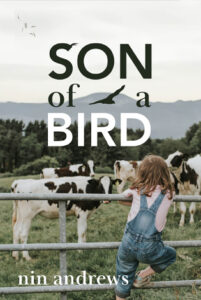Review by Mindy Kronenberg
The memoir has become a prominent and innovative literary genre, evolving from conventional prose to graphic and poetic forms, providing poignant and entertaining forays into the lives of authors with complex personal journeys (100 Demons, by Lynda Barry), even moving from illustrated page to stage as a musical experience (FUN Home, A Family Tragicomic, by Alison Bechdel). Nin Andrews, an acknowledged practitioner of the prose poem, has created an inventive and endearing series of episodes that comprise her childhood and coming of age, and introduces us to the eccentric dramatis personae of her challenging and spirited life.
Nin is our tour guide throughout this strange and endearing odyssey, heralding the journey with an ode to her younger self (“Dear Past Life”), the sixth and fragile imaginative child of an unconventional family with a farm, who wanted to be a horse, and
…practiced eating grass, whinnying and trotting/,
cantering and galloping, before jumping all the horse jumps/
one by one. Sometimes you fell and skinned your knees/
or banged your head, but you kept practicing until your legs ached,
and you were soaked with sweat… (1)
She shares the details of her life, presented as flash memoir scenarios grouped in chapters, held in memory like “a book inside my chest—an illustrated text, complete with drawings, photos, fantasies, memories, poems, old letters…” But It’s a text that no one has ever read, filled with the profound oddities of family life and precarious health that shaped her imagination and perspective, and that she is determined to retain and reveal as they arrive, page by page into a world that beckons, frightens, and fascinates.
“Once upon a time there was a girl who didn’t want to be born./ She was the last daughter of a gay man and an autistic woman…” (16). We get to meet the author’s parents, emerging from a family photograph, her father bald “…with bowline glasses and a tweed trilby hat…” and her mother “…with her hair permed tight as a poodle’s…” Her mother was averse to affectionate gestures and intimate contact, would recoil from her young daughter’s entreaty to be picked up, and read from ancient myths to an ailing child to avoid “those ghastly saccharin endings” of fairy tales. Her father “…was a man of secrets” who cautioned his daughter, determined to be a writer, “Don’t embarrass us. Don’t tell my stories. And don’t write about race or class…don’t write about the hired hands—the babysitters, the gardeners, and the men who worked in the barn…write as if you were raised by your mother, and not Miss Mary, not that pack of farmhands you ran around with like a feral hound.” (49)
We get to know Miss Mary, the Black nanny who passed away while the author was a child. She was part spirit guide, guardian to her “Little Pea:” “…Miss Mary wasn’t just a housekeeper, a savior, a saint…Miss Mary was my protector, mother, first love, goddess. I felt her like a song, a longing, an ache. I kept her close as a breath.” (p. 55) Throughout the book, Nin deftly provides both raw and elegant portraiture of the multifaceted figures who populate her world. We also witness coming-of-age moments on the farm, bad dreams and dark reverie in hospital rooms, the brave path to reconciling with the past while bringing it to light.
Son of a Bird is a collection of compact, intriguing personal vignettes that together provide an exhilarating reading experience.
Son of A Bird by Nin Andrews
Etruscan Press, 2024
SKU
Mindy Kronenberg is an award-winning poet and writer. She teaches writing, literature, and arts subjects at SUNY Empire State University, is editor of Oberon poetry magazine, and the author of Dismantling the Playground (Birnham Wood), Images of America: Miller Place (Arcadia), and OPEN, an illustrated poetry book (Clare Songbirds Publishers). She is the Literature Ambassador of the Long Island Poetry & Literary Repository, and the poetry curator for the Sculpture on the Trail exhibit for the Center for Environmental Education and Discovery (CEED).
-0-

